【最新】高中英语选修六+unit2+Poems+unit+2+poems+reading+课件
选修 6Unit 2 Poems
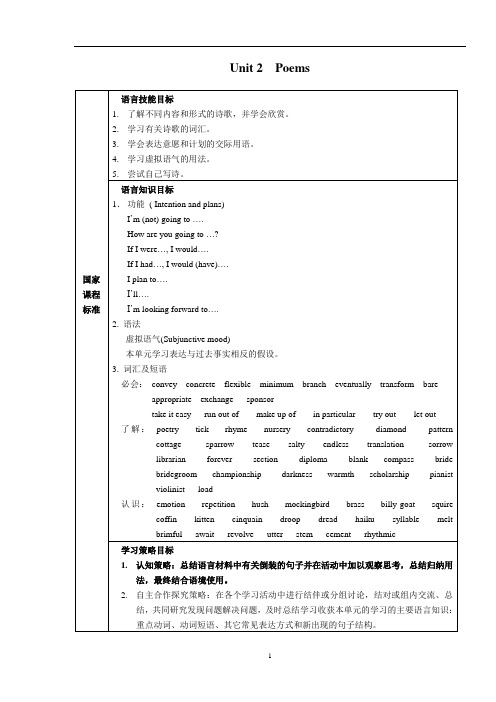
围绕诗歌这一话题设置了三个练习。前两个练习引导学生回顾儿时所接触的诗歌;第三个练习引导学生探讨写诗的目的。
★Pre-reading
主要让学生认识诗歌的种类和不同国家所赋诗歌的文化差异。该部分设置了两个练习,第一个练习让学生交流所喜爱的诗歌;第二个练习就阅读课文设计图表,让写诗从内容和写作风格两个方面认识阅读课文中的诗歌。
eg.You don't want to convey the impression that there's anything illegal going on.
(2)formal to take or carry something from one place to another synonym transport:传送、传输
本单元学习表达与过去事实相反的假设。
3.词汇及短语
必会:conveyconcrete flexible minimum branch eventually transform bare
appropriate exchange sponsor
take it easy run out of make up of in particular try out let out
eg.nursery education/teacher/school/rhyme
3.rhyme
(1) [countable]a short poem or song, especially for children, using words that rhyme诗、韵文
eg.nursery rhyme
学习策略目标
1.认知策略:总结语言材料中有关倒装的句子并在活动中加以观察思考,总结归纳用法,最终结合语境使用。
Unit 2 Poems(新人教版选修6)
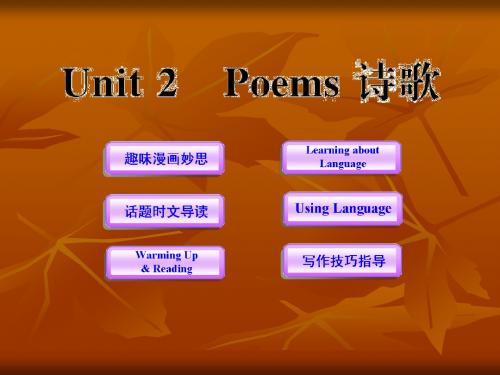
To seek a dream? Just to pole a boat upstream To where the green grass is more verdant; Or to have the boat fully loaded with starlight And sing
aloud in the splendour of starlight.
Their reflections2 on the shimmering3 waves Always linger in the depth of my heart. The floating heart growing in the sludge Sways leisurely under the water;
to them, or we will lose interest and direction of our life,
which may cause some of us to fail in our work or study, and even make us lose hope for our life.
【参考答案】Yes, I like them very much. When I read the poem, it seems that a clear picture is shown before me. I can feel the poets’ deep feelings about nation, nature and people. I like William Shakespeare and his poem The Sonnets.
一片云彩。
诗歌改写
诗歌既是语言的精华,也蕴含着丰富的哲理,对读者有
人教版英语选修六Unit 2 poems(A few simple forms of English
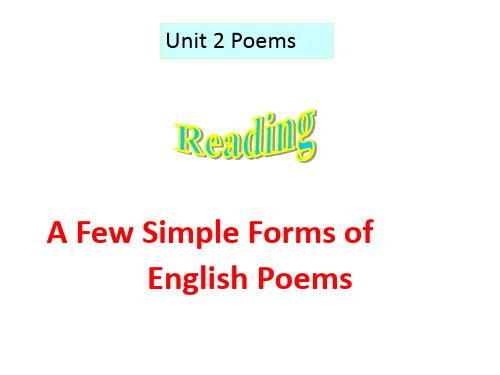
Expressions preview
take it easy 轻松; 从容 run out of 用完
make up of 构成 in particular 尤其; 特别
Skimming To get
general ideas
Skimming
Reading Comprehension I
Skim the poems on pages 10 and 11 and fill in the form on page 9.
Which poem
A B C D E F GH
describes a person?
√
tells a story?
√
describes an aspect of a season?
√√√
is about sport?
√
is about things that don’t make sense?
√
Which poem
Tang poems
赋得古原草送别 — 白居易 离离原上草,一岁一枯荣。 野火烧不尽,春风吹又生。
My Car List poems
My car is my office, with laptop and printer files and cell phone and paper clips scattered on the floor. My car is a small bookstore, brimmingly filled with boxes of books, cases of cassettes and CDs, fliers and order forms, a cash box, and credit card receipts.
人教版高中英语选修六Unit 2 Poems (2)
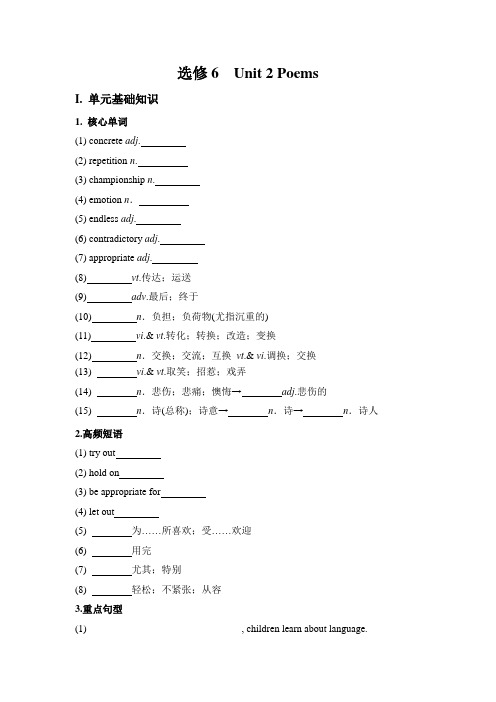
选修6 Unit 2 PoemsI. 单元基础知识1. 核心单词(1) concrete adj.(2) repetition n.(3) championship n.(4) emotion n.(5) endless adj.(6) contradictory adj.(7) appropriate adj.(8) vt.传达;运送(9) adv.最后;终于(10) n.负担;负荷物(尤指沉重的)(11) vi.& vt.转化;转换;改造;变换(12) n.交换;交流;互换vt.& vi.调换;交换(13) vi.& vt.取笑;招惹;戏弄(14) n.悲伤;悲痛;懊悔→adj.悲伤的(15) n.诗(总称);诗意→n.诗→n.诗人2.高频短语(1) try out(2) hold on(3) be appropriate for(4) let out(5) 为……所喜欢;受……欢迎(6) 用完(7) 尤其;特别(8) 轻松;不紧张;从容3.重点句型(1)_______________________________, children learn about language.孩子们通过童谣中的文字游戏学习语言。
(2)________________________, this stone would utter speech.行人归来石应语。
(3) There are various reasons_________________________.人们写诗有许多原因。
(4) And said __________they all were true.而且说,虽然奇怪,但它们都是真的。
(5) Some rhyme (like B)__________ others do not (like C).有些诗押韵(像B),但也有些不是这样(像C)。
II. 考点精析及演练1. convey vt. 传达;表达;运送;传导;传播【常见用法】convey sth. to sb. 向某人表达/传递某物convey sb./sth. from A to B把某人或某物从A地运送到B地convey one's feelings/meanings 表达某人的感情/意思【用法检测】(1)As a teacher rich in experience, he knows exactly to the students.作为一个经验丰富的老师,他知道如何准确地向学生表达他的想法。
人教版高中英语选修6《Unit 2 Poems》教案2篇
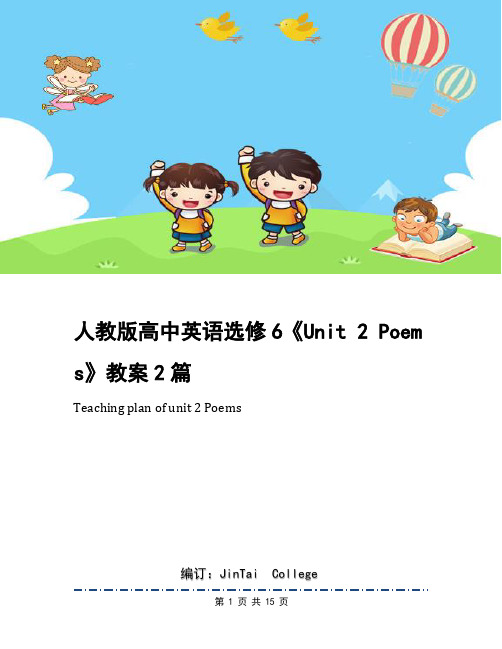
人教版高中英语选修6《Unit 2 Poem s》教案2篇Teaching plan of unit 2 Poems编订:JinTai College人教版高中英语选修6《Unit 2 Poems》教案2篇前言:英语作为在许多国际组织或者会议上都是必需语言,几乎所有学校选择英语作为其主要或唯一的外语必修课。
英语教学涉及多种专业理论知识,包括语言学、第二语言习得、词汇学、句法学、文体学、语料库理论、认知心理学等内容。
本教案根据英语课程标准的要求和教学对象的特点,将教学诸要素有序安排,确定合适的教学方案的设想和计划、并以启迪发展学生智力为根本目的。
便于学习和使用,本文档下载后内容可按需编辑修改及打印。
本文简要目录如下:【下载该文档后使用Word打开,按住键盘Ctrl键且鼠标单击目录内容即可跳转到对应篇章】1、篇章1:人教版高中英语选修6《Unit 2 Poems》教案2、篇章2:人教版高中英语选修6《Unit 2 Poems》教案篇章1:人教版高中英语选修6《Unit 2 Poems》教案教学准备教学目标教学目标(Teaching Aims)知识与技能(Knowledge and Skills)1.了解教学大纲关于语法填空的命题特点。
2.能够根据语法填空的命题特点自己编语法填空的题目3.掌握语法填空的解题方法与技巧过程与方法(Process and Methods)让每一位同学都能参与到课堂教学与活动中来,以小组或结对的形式进行相互学习和讨论。
情感态度与价值观(Feeling, Attitudes and Values)学习应对语法填空是与课文相结合,让学生在了解各种不同诗歌形式的背景下学习语法填空的设题与解题特点,从而更加理解英语诗歌的特色,更加懂得如何阅读和欣赏英语诗歌。
教学重难点教学重点(Important Points):1.让学生了解语法填空的命题特点2.掌握语法填空的解题方法与技巧教学难点(Difficult Points):语法填空中词性的转换教学过程(Teachers’ Activities)Step I: Lead-in① Review the new words and expressions of this unit by them together, and then do Task 1---speak out the other forms according to the giv en words② Listen to the song Jingle Bells and try tofill a word into each blank.Step II : Pre-practising1.Questions① Do you think it is difficult to complete the items of blank-filling with grammar knowledge?② Have you figur ed out the characteristics of the item?2.ExplainingIn this item there are 10 blanks for you to fill in with less than one proper word① some blanks with a given word while otherswith none② fill in the blanks with the proper form of the given word according to its grammatical and logical meaning.③ choose a preposition, pronoun, conjunction or an article to fill in the blank without any given word.3.DiscussionHow can we finish the items step by step with our grammar knowledge?① ___________________________________________.② _ __________________________________________.③ ___________________________________________.Step III : While-practising1.Making an item of grammatical blank-filling based on the para graph of the text.① more than 5 blanks.② some blanks with given word.③ others with none.2.exchange the item you made for your partner to complete it .3.The whole class finis h the one the teacher prepared for them.Step IV : Post-practising1.Check some of the students’ anwsers and give comments.2.Draw a conclusionStep V: Homework Assign ment1.Further improve your skills of dealing with the grammar filling.plete Ex.2 on Page 10, Nanfang New Class篇章2:人教版高中英语选修6《Unit 2 Poems》教案【按住Ctrl键点此返回目录】教学准备教学目标Teaching goals1.Target languagea. Important words and phrasesPoem, poetry, recite, aspect, convey, nursery, rhyme, diamond, cottage, balloon, sparrow, tease, salty, endless, translate, nursery rhyme, take it easy, run out of, make up ofb. Important sentencesWhich poem is about things that don’t make sense?Poets use many different forms of poems toexpress themselves.I hadn’t taken my eye off the ball.We hadn’t taken it easy.The poem is made up of five lines.A lot of Tang poetry has been translated into English. The translations have a free form that English people like to copy.2.Ability goalsa. Enable Ss to talk about different types of poems: nursery rhymes; list poems; cinquain,; haiku; Tang poemsb. Enable Ss to talk about different purposes of writing poems.c. Understand the main theme of each poem.d. Enable Ss to chant some of their favorite poems.3.Learning abilityEnable Ss to distinguish different types of poems 教学重难点Teaching important points1.Talk about five main types of poems.2.Understand the main purpose of writing the poems.Teaching difficult points1.Find the rhythm of each poem.2.Chant the poem.3.Understand the main purpose of writing the poems.教学过程Teaching procedures to share a feeling or experience; to describe something in detail or give an impression; to get the reader to think about an idea; to express a point of view; to make the reader experience the sight, sounds, smells, feel and tastes of something; to create a mood, to play with words--- their sounds, rhyme and rhythm.)If time permits, in small groups or as a class, discuss the kinds of topics that poets write about.( people, animals, nature, landscapes, the sea, the seasons, stories, death, war, youth and old age,feeling and experiences, emotions like love, hate, sadness, regret and desire, etc.)Step 4.Pre-readingPeople from different countries write different kinds of poems. Get Ss to discuss the questions on Page 9 with their partners: Do you have a favorite poem in Chinese? Why ? Do you have a favorite poem in English? Why?As to exercise 2, give Ss practice in animportant reading skill: scanning a text, that is, looking through a text quickly to find specific information. Read the table in exercise 2 with the Ss. Tell them that they are going to look for the information in the table, just in the poems themselves, not in the other parts of the text. They are to look only for those pieces of information and not readevery word. Do an example with them.Suggested answers to exercise 2:Step 5.ReadingScanningGet the Ss to read the passage quickly and accurately and meanwhile help the Ss to form a good habit of reading. Teacher gives Ss a couple of minutes to look through the whole passage. Tell them to read the text silently and then ask some detailed questions about the text on the slide show . Teacher should encourage Ss to express their ideas.Q1.Why do people write poetry?Q2.How many forms of poems are mentioned in the passage? What are they?Q3.What does “nursery rhyme” mean? Why do they delight small children?Q4.What’s the characteristic of “list poems”? What about “cinquain”?Q5.Why do English People like “Haiku”?Q6.Are you familiar with Tang Poems? Do you know the title of the last poem in the text?ListeningBefore Ss read the text, have them close their books and listen to the text with their eyes closed. This gives Ss the opportunity to listen to the sounds or “music” of the poems before reading them in detail. Tell them that it doesn’t ma tter if they don’t understand every word.First readingGet Ss to read the text carefully, finding the one sentence that sums up the paragraph of each part.. Underline the topic sentence.Second readingTell Ss that they are going to look at the rhythm of two of the poems. Make sure they know what rhythm is. Read the limerick aloud and have Ss listen for the strong beats. Then have them clap the strong beats asyou read. Mark the strong beats on the limerick on the board.There was an old man with a beardWho said “it is just as I feared”.“Four insects and thenTwo birds and a henHave all made a home in my beard”.Now read the poem A & B. Ask them to mark the strong beats on the two poems that have a strong rhythm. Check their answers . Then play the tape and get them to clap to the strong beats in those two poems.Third readingJust as any scene can serve as the subject of a painting, so any part of daily life can provide material for a poem.. Of course, the choice that the artist or poet makes relates to his or her purpose. Poetry is usually short and compact, so it should beread several times, preferably aloud, to appreciateits meaning. Read the last poem (Poem H), and answer the following questions:Q1.What parts of the poem suggest that the woman loves her husband?Q2.How do you understand the sentence” Shouldthe journeyer return, this stone would utter speech.”? Explain the sentence in your own words.Q3.What picture do you have in your mind when you read the above sentences?Q4.Do you know the Chinese title of this poem? Do you know the Chinese version of the poem?Step 6.Make a short summary of this period.课后习题Homework1.Surf some websites to find out more information about poets.2.Review the content of the reading passage.3.Finish the exercises on Page 12& 13.-------- Designed By JinTai College ---------。
人教版高中英语选修六Unit2Poems-词汇篇(教师版)
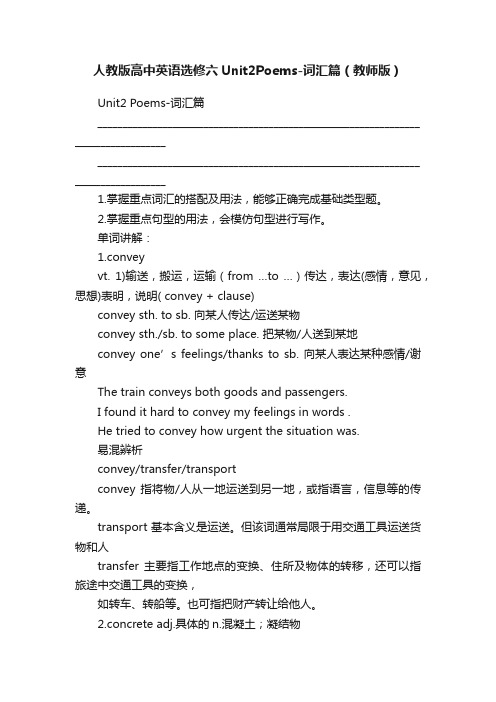
人教版高中英语选修六Unit2Poems-词汇篇(教师版)Unit2 Poems-词汇篇________________________________________________________________ __________________________________________________________________________________ __________________1.掌握重点词汇的搭配及用法,能够正确完成基础类型题。
2.掌握重点句型的用法,会模仿句型进行写作。
单词讲解:1.conveyvt. 1)输送,搬运,运输(from …to …)传达,表达(感情,意见,思想)表明,说明( convey + clause)convey sth. to sb. 向某人传达/运送某物convey sth./sb. to some place. 把某物/人送到某地convey one’s feelings/thanks to sb. 向某人表达某种感情/谢意The train conveys both goods and passengers.I found it hard to convey my feelings in words .He tried to convey how urgent the situation was.易混辨析convey/transfer/transportconvey 指将物/人从一地运送到另一地,或指语言,信息等的传递。
transport 基本含义是运送。
但该词通常局限于用交通工具运送货物和人transfer 主要指工作地点的变换、住所及物体的转移,还可以指旅途中交通工具的变换,如转车、转船等。
也可指把财产转让给他人。
2.concrete adj.具体的n.混凝土;凝结物e.g. You need to offer concrete evidences to support your idea.It is easier to think in concrete terms rather than in the abstractConcrete is very strong and is used in many modern buildings.3.contradictory adj. 引起矛盾的;好反驳的vt. Contradict n. contradictionThe evidence seems contradictory to our findings.His public speeches are in direct contradiction to his personal lifestyle.All evening his husband contradicted everything she said.4.flexible : adj.灵活的;可弯曲的adv: flexibly n: flexibilitye.g. (1) The government needs a more flexible approach to education.(2) We can be flexible about your starting date.(3) Computers offer a much greater degree of flexibility in the way work is organized5.patternn.模式,方式,形式The illness doesn’t seem to follow its usual pattern.n.图案She wore a dress with a pattern of roses on it.n.模范;榜样The company set a pattern for others to follow.pattern sth on/after sth 模仿,效仿This is a new technique patterned on Japanese ideas.6.take it easy.take. . . by surprise 突袭,使…大吃一惊take. . . seriously 认真对待take it for granted 认为理所当然take it easy = take things easyThe doctor told me to take it easy and not to worry too much.7.run out (of ) 用完;耗尽( vt.),失效;过期If he hadn’t run out of money ,he would have bought it. My passport has run out.run out/ give out (燃料,食物,钱等)run out of exhaust / use up 筋疲力尽E.g. I was exhausted by the hard training.I was used up after the argument.8.be made up of =make up 组成,构成Girl students make up 40% of the student number.make up 编造;化装;弥补(同事)make up for sth. 弥补(用其它方式,以平衡)make out 理解,辨认出make it 获得成功;准时到达make for sth. 向……移动;促成……be made of 由……制成(看出原料)be made from 由……制成(看不出原料)9.tease :v. 取笑;招惹;戏弄Don’t get upset. I was only teasing.She used to tease me about my hair.Don’t tease the cat by pulling its tail.拓展延伸laugh at sb. 嘲笑某人make fun of sb. 愚弄某人play jokes on sb. 开某人的玩笑play tricks on sb. 捉弄某人10.end: v/n 末端,尽头,结束endless: adj. 无止境的,无穷无尽的ending: n. 结局,结尾end in +n. 以……为告终end up + prep./v-ing/ adj. 达到某种状态end up with… 以……为结束E.g. (1) end in tears/ failure/ divorce(2) end up in prison/ apologizing/ dead(3) end up with an English song11.transform vi. & vt. 转化;转换;改造transform… into 改变为;转变为They have transformed their rooms into a hotel.The situation has been greatly transformed12.eventually adv 最后;终于=finally1)I was eventually granted an exit visa.2)Eventually these feelings could be held in no longer.3)She hopes to get a job on the local newspaper and eventually work for “The Times”.13.bare adj 赤裸的,勉强的,起码的,空的,没有…的(of)barely: adv. 勉强,仅仅e.g. I barely passed my math class last semester.He was barely able to pay the tent last month.14.appropriate: adj. 适合的;合适的[(+to/for)]1) The movie is appropriate for children aged 12 and over.2) She picked up a dress appropriate for the occasion.归纳总结be appropriate for 对……合适it is appropriate for sb. to do sth. 适合某人做某事15.exchange n. & v. 交换;交流;互换exchange sth. with sb.in exchange for 交换exchange sth. for sth. 用某物换某物e.g. He changed his old car for a new one.Solids can change into liquids.16.sponsor n.赞助人;主办者vt.赞助;发起Have you found out the sponsor of our basketball match?The bank had offered to sponsor him at university.17.hold on 等一下;别挂电话;继续,坚持;抓住,握住(to/onto)1) Hold on a minute! Isn’t that your brother’s car over there?2)It was hard to keep the business going,but he held on.3) Hold on to the rope.拓展延伸hold back 阻挡;隐瞒,抑制,hold down 压制,控制hold off 推迟,拖延;hold out 伸出,坚持,维持hold up 延误;举起,经受得住18.inspire vt. 激发;鼓励;启发n. inspiration 灵感,好办法adj. inspired 获得灵感的,超凡inspiring 振奋人心的,激励人的Be inspired by 受……的鼓励Inspire sb to + n 鼓励某人(做)某事Inspire sb with + n 激起某人的(感情,思想)19.let out 发出;泄漏(1)Don’t let ou t the plan to the press(2)He let out the bird from the cage.拓展延伸let down 放下;使失望;let alone 更不用提;更别说let go 放开;松手let it go 算了;放手20.load v. 放入;装载1)At sunset,he came down the hill with his load of firewood.2)I have a full load of work.3)Knowing he was safe was a load off my mind.4)I started loading the boxes into the truck.5)Our site is loaded with hundreds of ads on each page.6) The comment is loaded with emotion.重点词组:1. go over 复习,检查2. make sense 有意义,说得通(Sb.) make sense of sth理解……(Sth.) make sense to sb. 有意义,说得通3. recite / read / explain sth. to sb. 给某人背诵/读/ 解释……4. couvey one`s emotions表达情感5. bow to … 向鞠躬/ 屈服6. stay/sit up 熬夜7. take it easy放轻松,别紧张take one`s time 别着急,慢慢来8. (Sb.) run out of sth.用完,耗尽(及物)(Sth.) run out 用完(不及物)9. make up 组成/ 编造/ 化妆/ 弥补/ 和解be made up of = consist of … 由……组成10. a few more minutes 再多几分钟11. be popular with … = be well received by … 很受欢迎12. be brimful of = be full of … 充满13. translate A into B把A翻译成B14. week in ,week out 一周又一周day by day 一天又一天on and on 继续不停地16. by chance / accident 碰巧17. hold on 继续/ 别挂断(电话)18. (Sb. / Sth.) be likely to do sth.有可能…..19. try out 试验try on 试穿20. let out 泄漏/ 发出(声音) / 释放/ 放宽(衣服)21. look forward to 盼望22. inspire sb to do sth 激励,鼓舞某人做某事重点句型:1. There are various reasons why people write poetry.人们写诗有各种各样的原因。
人教版高中英语选修六Unit2Poem知识讲解Unit2Poems语言点
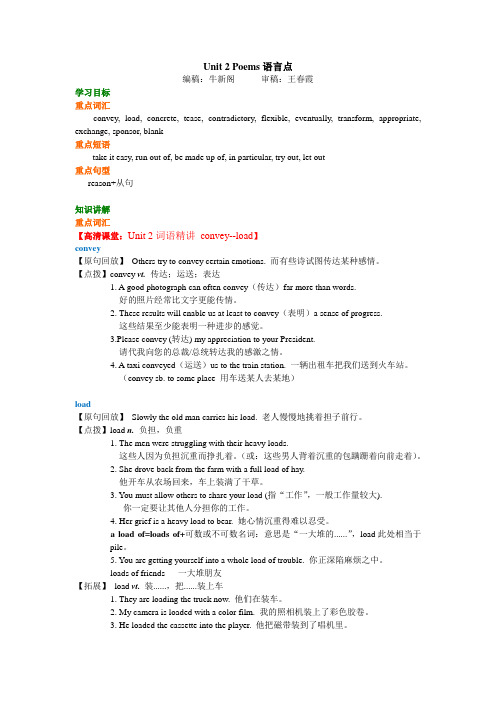
Unit 2 Poems语言点编稿:牛新阁审稿:王春霞学习目标重点词汇convey, load, concrete, tease, contradictory, flexible, eventually, transform, appropriate, exchange, sponsor, blank重点短语take it easy, run out of, be made up of, in particular, try out, let out重点句型reason+从句知识讲解重点词汇【高清课堂:Unit 2词语精讲convey--load】convey【原句回放】Others try to convey certain emotions. 而有些诗试图传达某种感情。
【点拨】convey vt.传达;运送;表达1. A good photograph can often convey(传达)far more than words.好的照片经常比文字更能传情。
2. These results will enable us at least to convey(表明)a sense of progress.这些结果至少能表明一种进步的感觉。
3.Please convey (转达) my appreciation to your President.请代我向您的总裁/总统转达我的感激之情。
4. A taxi conveyed(运送)us to the train station. 一辆出租车把我们送到火车站。
(convey sb. to some place 用车送某人去某地)load【原句回放】Slowly the old man carries his load. 老人慢慢地挑着担子前行。
【点拨】load n. 负担,负重1. The men were struggling with their heavy loads.这些人因为负担沉重而挣扎着。
高中英语选修六+unit2+Poems+unit+2+poems+reading+课件
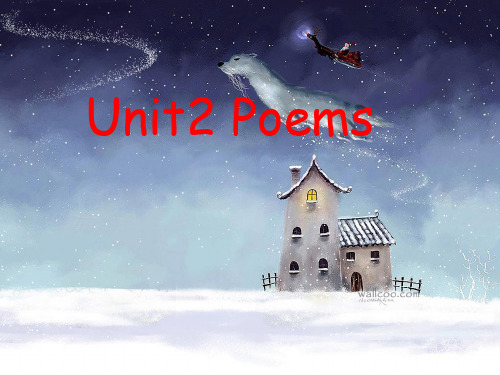
How many kinds of poems does the passage talk about? What are they? five kinds Nursery rhymes, list poems, the cinquain, haiku and Tang poems.
Haiku 俳句诗
the characteristics of haiku
a Japanese form of poetry 17 syllables easy to write give a clear picture and create a special feeling using a few words
Papa’s going to buy you a looking glass.
If that looking-glass gets broke, [a:s]
Papa’s going to buy you a billy-goat. [əu]
If that billy-goat runs away,
D is a description of a lovely brother.
E is a description of hot and boring summer.
Brother
Beautiful, athletic
Teasing, shouting, laughing
Friend and enemy too
before, if we hadn’t taken it easy, if we hadn’t run out of energy, We would have won… if we’ve been better!
高二选修6 unit2 poems
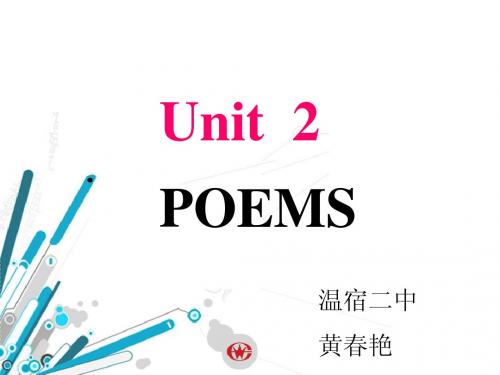
3.Do the players in poem C win? Why? No, they didn’t win. because: Jack didn’t score that goal; they didn’t have enough time; they hadn’t train hard….
Describe sth in a way that will give the reader a strong impression. Convey certain emotions.
Task 3 read again and fill in the chart. Forms of poems Nursery rhymes Features Strong rhythm and rhyme, a lot of repetition, easy to learn and to recite
√ √ √
describes a river scene? has rhyming words at √ the end of lines? repeats words or √ phrases?
√ √ √
Careful reading
1. Why do people write poems? Tell a story.
Translation of Chinese poems
1. What is the baby’s father going to buy if the diamond ring turns to brass? If the diamond ring turns to brass, the baby’s father will buy a looking-glass. 2. What is the baby’s father going to do if the looking-glass gets broken? If the looking-glass gets broken, the baby’s father will buy a billy-goat.
高中英语选修6:Unit+2+Poems+教案5+
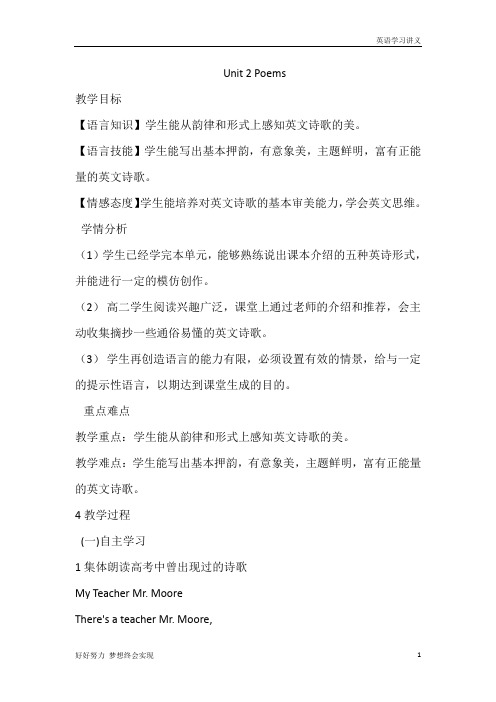
Unit 2 Poems教学目标【语言知识】学生能从韵律和形式上感知英文诗歌的美。
【语言技能】学生能写出基本押韵,有意象美,主题鲜明,富有正能量的英文诗歌。
【情感态度】学生能培养对英文诗歌的基本审美能力,学会英文思维。
学情分析(1)学生已经学完本单元,能够熟练说出课本介绍的五种英诗形式,并能进行一定的模仿创作。
(2)高二学生阅读兴趣广泛,课堂上通过老师的介绍和推荐,会主动收集摘抄一些通俗易懂的英文诗歌。
(3)学生再创造语言的能力有限,必须设置有效的情景,给与一定的提示性语言,以期达到课堂生成的目的。
重点难点教学重点:学生能从韵律和形式上感知英文诗歌的美。
教学难点:学生能写出基本押韵,有意象美,主题鲜明,富有正能量的英文诗歌。
4教学过程(一)自主学习1集体朗读高考中曾出现过的诗歌My Teacher Mr. MooreThere's a teacher Mr. Moore,Who is lovely and thirty-four.Always encouraging us to try,He leads us to a world of "why”.We all love him more and more.2快速浏览导学案附页中的学生习作,挑选出你最喜欢的一首诗,并进行朗读。
(学生习作在附两首)To Ms. English----by项阳 from Class3, Senior2You are a woman who is beautifulWhichever lesson is meaningfulWhatever you say is helpfulEach class is wonderfulSo my life is colourfulInside my heart is gratefulAnd my future is sure to be successfulTo All Teachers ----by 王欣 from Class3 Senior2You say that this class won’t be delayed(拖堂)But we have a shorter time for the breakYou say that your today’s homework is littleBut we have to stay up very lateThis is why I am scaredWhen you say the coming exam is simple【设计目的】:学生课前以描写科任教师或学校生活为主题,进行了练笔,习作中出现了一批形式规范的诗歌,同时也有几首形式灵活的诗歌,挑选出一些呈现在导学案上,让学生进行对比学习,快速带领学生进入诗歌世界,很好地激起了学生的学习热情。
人教版高中英语选修6:Unit 2 Poems(2)
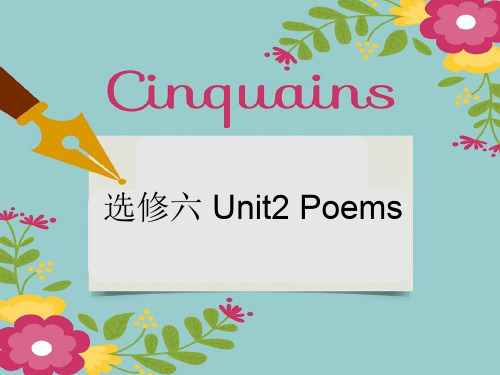
sentence that further relates feelings about the subject in line 1)
1.Choose a subjet from the worksheet, such as friends, hope, peace... 2. Fill in boxes on a worksheet to describe their subject
夏天 困乏,咸涩 干涸,枯萎,恐怖
周而复始 Summer 永无止境 Sleepy, salty
Drying, drooping, dreading Week in, week out Endless
Appreciation 2
Brother
Beautiful, athletic
Teasing, shouting, laughing 兄弟
A sensory poem, or five-senses poem, describes how a poet perceives what something looks like, tastes like, smells like, feels like, and sounds like. It does not need to rhyme.
选修六 Unit2 Poems
five kinds
Nursery List rhymes poems
Haiku
Cinquain
Tang poems
童谣 清单诗 俳句诗 五行诗 唐诗
1.Draw a picture 2.Display and comment
人教版高中英语选修六Unit 2 Poems
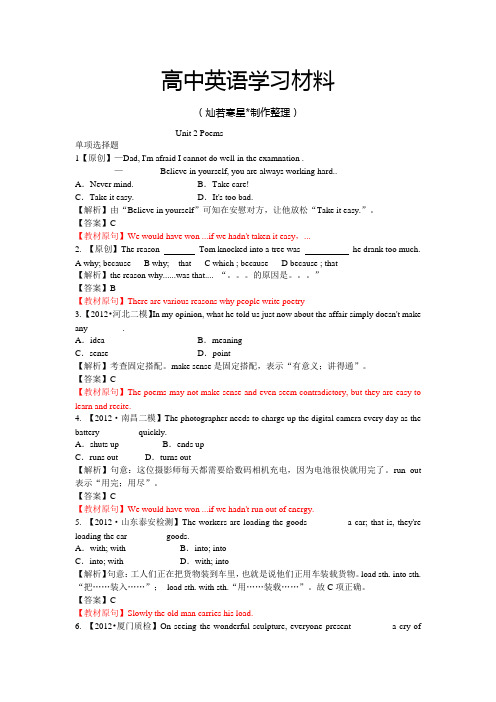
高中英语学习材料(灿若寒星*制作整理)Unit 2 Poems单项选择题1【原创】—Dad, I'm afraid I cannot do well in the examnation .—________ Believe in yourself, you are always working hard..A.Never mind. B.Take care!C.Take it easy. D.It's too bad.【解析】由“Believe in yourself”可知在安慰对方,让他放松“Take it easy.”。
【答案】C【教材原句】We would have won ...if we hadn't taken it easy,...2. 【原创】The reason Tom knocked into a tree was he drank too much.A why; becauseB why; thatC which ; becauseD because ; that【解析】the reason why......was that.... “。
的原因是。
”【答案】B【教材原句】There are various reasons why people write poetry3. 【2012•河北二模】In my opinion, what he told us just now about the affair simply doesn't make any________.A.idea B.meaningC.sense D.point【解析】考查固定搭配。
make sense是固定搭配,表示“有意义;讲得通”。
【答案】C【教材原句】The poems may not make sense and even seem contradictory, but they are easy to learn and recite.4. 【2012·南昌二模】The photographer needs to charge up the digital camera every day as the battery ________ quickly.A.shuts up B.ends upC.runs out D.turns out【解析】句意:这位摄影师每天都需要给数码相机充电,因为电池很快就用完了。
【最新】高中英语选修六+unit2+Poems+知识点+课件

10. look back
典型句式运用
1.There are various reasons why people
write poetry.
考点提炼
the reason why...
动名词
干……的理由
,
后接 句子 ;the reason for...和它同义,后接
名词
或
句型that’s why...和that’s because...的
ห้องสมุดไป่ตู้
3.appropriate
Match the beginning of each sentence with the
appropriate
ending. (回归课本P13)
观察思考 Write in a style appropriate to your subject. A dirty face is not appropriate for the
I shook hands and exchanged a few words with the manager. You can exchange your currency for dollars in the hotel. Would you like my old TV in exchange for
(2)
Is now an appropriate time to make a
speech?
(3) It is appropriate that trees at this time. we (should) plant
4.exchange
If there had not been an exchange programme, ... (回归课本P13)
人教版英语选修6 Unit2 Poems
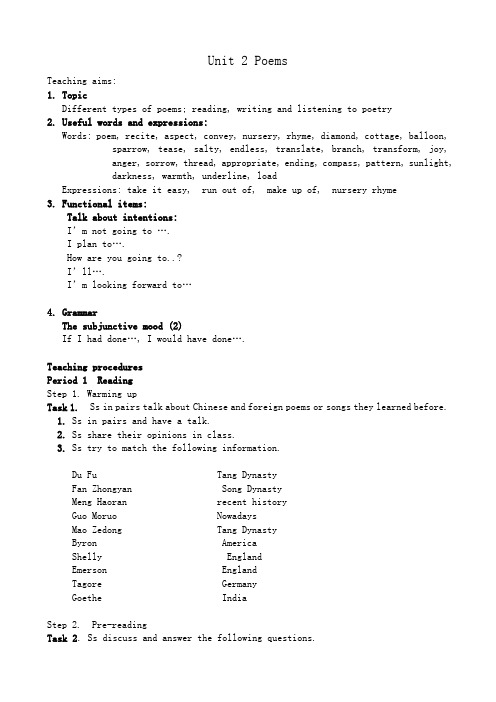
Unit 2 PoemsTeaching aims:1.TopicDifferent types of poems; reading, writing and listening to poetryeful words and expressions:Words: poem, recite, aspect, convey, nursery, rhyme, diamond, cottage, balloon, sparrow, tease, salty, endless, translate, branch, transform, joy,anger, sorrow, thread, appropriate, ending, compass, pattern, sunlight,darkness, warmth, underline, loadExpressions: take it easy, run out of, make up of, nursery rhyme3.Functional items:Talk about intentions:I’m not going to ….I plan to….How are you going to..?I’ll….I’m looking forward to…4.GrammarThe subjunctive mood (2)If I had done…, I would have done….Teaching proceduresPeriod 1 ReadingStep 1. Warming upTask 1. Ss in pairs talk about Chinese and foreign poems or songs they learned before.1.Ss in pairs and have a talk.2.Ss share their opinions in class.3.Ss try to match the following information.Du Fu Tang DynastyFan Zhongyan Song DynastyMeng Haoran recent historyGuo Moruo NowadaysMao Zedong Tang DynastyByron AmericaShelly EnglandEmerson EnglandTagore GermanyGoethe IndiaStep 2. Pre-readingTask 2. Ss discuss and answer the following questions.1.Why do people write poems?Sample answers:t o express one’s hopes and intentions;to call up people to do something;to practice writing; to pour out one’s feelings;to show dissatisfaction or praise…2.People from different countries write different kinds of poems. Do you havea favourite poem in Chinese? Why is it your favourite poem? Do you have afavourite poem in English? Why is it your favourite poem?Step 3. ReadingTask 3: First reading: Ss skim the poems and fill in the following form.Task 4. Second reading: Ss read and answer the questions of Ex 2 on page 11.Sample answers:1.The main topic of the reading passage: different forms of English poems.2.Nursery rhymes; list poems; cinquain; haiku; Tang poems.3.Poem A has a strong rhythm. Poems A and B have rhyming lines.4.Poem F gives a clear picture in the mind.Task 5. Third reading: Ss read again and fill in the chart.Step 4. After- readingTask 6: Ss listen to the recording of the passage and try clapping the beats. Then answer the questions on page 12.Sample answers:1.If the mirror gets broken, the baby’s father will buy a billy-goat instead.2.If the goat runs away, the baby’s father will buy another goat.3.The speaker is writing about football.4.No, his or her team didn’t win.5.The players didn’t win because: Jack didn’t score that goal; they didn’t haveenough time; they hadn’t train hard….6.The speaker doesn’t really believe his or her own excuses, because there hastoo many ifs…7.Yes. I always give excuses when I don’t win or do something.No. I’ve never given any excuses when I don’t win or do something.8.The poem tells a story about a woman who was waiting on the mountain top foe herhusband. The story goes like this: A loyal wife kept standing on a mountain top waiting for her husband’s coming back. Year after year the wife became a stone which looks like a woman watching into far distance.9.The woman has the feelings of :loneliness: she was alone watching her husband on the mountain top.Love: she waited year after year despite wind and rain.Trust: she believed her husband would come back one day.Sorrow: year after year, she waited and waited without seeing any hope of her husband’s coming back, she was very sad.Period nguage learningStep 1. RevisionSs in pairs talk about the different kinds of poems.Step 2. Language points1.repetition: repeat + ition常见的名词后缀有:-ition, -ance, -al, -tion, -ment等expose – exposition add- additionappear – appearance resist – resistancearrive – arrival refuse – refusalcreate – creation explain – explanationagree – agreement argue – argument2.bow to sb. 向某人鞠躬;屈服于he bowed to the Queen.I’m not at all happy about it, but I think I’ll have to bow to the inevitable.3.We would have won if Jack had scored that goal.本句用的是虚拟语气过去式,即假设一个与过去事实相反的条件。
- 1、下载文档前请自行甄别文档内容的完整性,平台不提供额外的编辑、内容补充、找答案等附加服务。
- 2、"仅部分预览"的文档,不可在线预览部分如存在完整性等问题,可反馈申请退款(可完整预览的文档不适用该条件!)。
- 3、如文档侵犯您的权益,请联系客服反馈,我们会尽快为您处理(人工客服工作时间:9:00-18:30)。
Task 2 Detailed reading Talk about the characteristics of each form of poems. What are the poems (A-H) about?
Nursery rhymes
童谣
the characteristics of nursery rhymes(within 20 words) the concrete but imaginative language; rhyme; strong rhythm; a lot of repetition; easy to learn and recite
Which two poems have a strong rhythm? Rhythm is the beat that runs through the lines in a poem. It is when a stressed syllable is followed by an unstressed syllabl ridiculous things
I saw a fish-pond all on fire, I saw a house bow to a squire, I saw a person twelve-feet high, I saw a cottage in the sky, I saw a balloon made of lead, I saw a coffin drop down dead, I saw two sparrows run a race, I saw two horses making lace, I saw a girl just like a cat, I saw a kitten wear a hat, I saw a man who saw these too,
five lines
convey a strong picture in just a few words
What is the poem D&E about? (each within 10 words)
A few simple forms of English poems.
How many kinds of poems does the passage talk about? What are they? five kinds Nursery rhymes, list poems, the cinquain, haiku and Tang poems. A B&C D&E F&G H
What is the poem C about? losing a football match and a lot of excuses for their failure
cinquain
五行诗
the characteristics of cinquain (within 15 words)
What is the poem A about?
(within 10 words)
a father’s love for his baby
Hush, little baby, don’t say a word, Papa’s going to buy you a mockingbird. [ə:d] If that mockingbird won’t sing, Papa’s going to buy you a diamond[in] ring. If that diamond ring turns to brass, Papa’s going to buy you a looking glass. If that looking-glass gets broke, [a:s] Papa’s going to buy you a billy-goat. [əu] If that billy-goat runs away, [ei] Papa is going to buy you another today.
Unit2 Poems
If winter comes, can spring be far behind? Shelley(雪莱)--Ode to the west wind (西风颂)
Reading
Task 1 Scanning and skimming What’s the main idea of the passage?
List poems
清单诗
the characteristics of list poems (within 15 words) a flexible line length; repeated phrases;
some rhyme
What is the poem B about?
(within 10 words)
And said though strange they all were true.
Our first football match We would have won… if Jack had just scored that goal, if we’d had just a few more minutes, if we had trained harder, if Ben had passed the ball to Joe, if we’d had thousands of fans screaming, if I hadn’t taken my eye off the ball, if we hadn’t stayed up so late the night before, if we hadn’t taken it easy, if we hadn’t run out of energy, We would have won… if we’ve been better!
